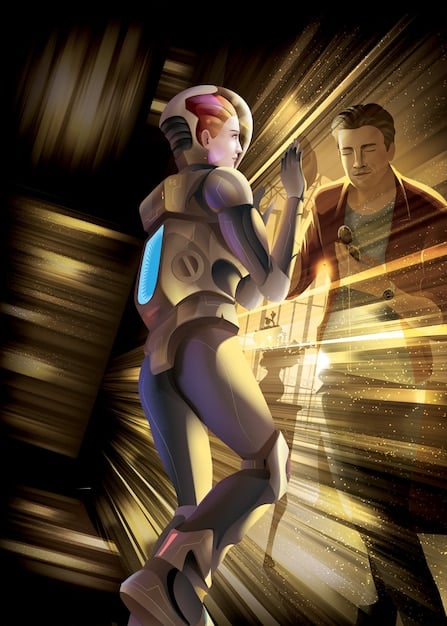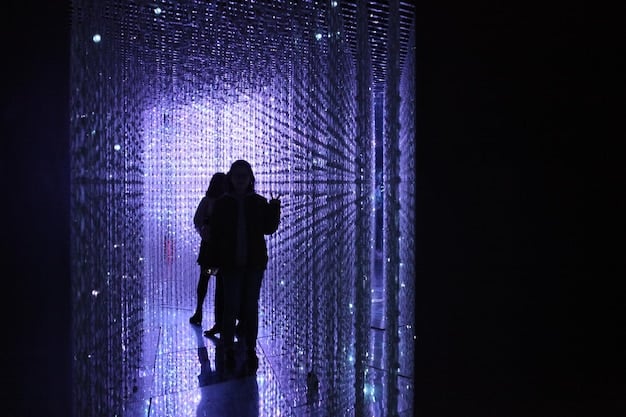Sci-Fi Thrillers: The Hottest New K-Drama Genre in the US

Anúncios
Sci-fi thriller K-dramas are experiencing a surge in popularity among US audiences, blending futuristic concepts with suspenseful narratives to create compelling viewing experiences that explore themes of technology, society, and the human condition.
Anúncios
The landscape of Korean dramas, or K-dramas, is constantly evolving, and a fascinating new trend is capturing the attention of audiences in the US: the rise of sci-fi thriller K-dramas. This genre, blending futuristic concepts with intense suspense, is rapidly gaining popularity for its innovative storytelling and unique cultural perspective.
Sci-Fi Thrillers: A New Wave in K-Drama
Sci-fi thrillers are emerging as a significant force in the K-drama scene, attracting a growing fanbase in the US. This blend of genres offers a fresh perspective, combining the emotional depth and character-driven narratives typical of K-dramas with the high-stakes tension and imaginative worlds of science fiction.
Anúncios
Why Sci-Fi Thrillers? The Appeal to US Audiences
Several factors contribute to the rising popularity of sci-fi thriller K-dramas among US viewers. The genre offers a departure from more traditional K-drama themes while retaining the elements that have made them globally successful, such as strong character development and compelling storylines.
- Unique Blend of Genres: The fusion of sci-fi and thriller elements provides a novel viewing experience, catering to fans of both genres.
- High Production Value: Many of these dramas boast impressive special effects and visual storytelling, rivaling those of Western productions.
- Thematic Resonance: These dramas often explore universal themes of technology, society, and the future, resonating with a broad audience.
Beyond the core appeal of the genre, the accessibility of K-dramas through streaming platforms has played a crucial role in their growing popularity. US audiences now have unprecedented access to a wide variety of Korean content, including the latest sci-fi thrillers.

The rising popularity of sci-fi thriller K-dramas in the US represents a significant shift in the landscape of Korean entertainment and its global reach. As more viewers discover these innovative and engaging dramas, the genre is poised to become a mainstay of the K-drama scene.
Key Elements of Sci-Fi Thriller K-Dramas
Sci-fi thriller K-dramas stand out due to their unique combination of elements that set them apart from other genres. Understanding these elements is key to appreciating their growing appeal.
The Fusion of Sci-Fi and Thriller
At the heart of the genre is the seamless integration of science fiction and thriller elements. These dramas often explore futuristic technologies, dystopian societies, and mind-bending concepts, all while maintaining a sense of suspense and intrigue.
- Technological Advancements: Sci-fi thrillers frequently depict advanced technologies, such as artificial intelligence, virtual reality, and genetic engineering, raising ethical and societal questions.
- Dystopian Settings: Many dramas are set in dystopian worlds, where societal structures are oppressive, resources are scarce, and individual freedoms are curtailed.
- Suspenseful Narratives: The thriller aspect keeps viewers on the edge of their seats with twists, turns, and high-stakes conflicts, creating a gripping viewing experience.
These elements are not merely window dressing; they are integral to the storytelling, driving the plot forward and exploring complex themes.
Beyond the core elements of sci-fi and thriller, these dramas also incorporate elements of mystery, romance, and social commentary, adding layers of depth and complexity to the narratives. This multifaceted approach enhances their appeal to a broad audience.
Popular Sci-Fi Thriller K-Dramas in the US
Several sci-fi thriller K-dramas have gained significant traction in the US, showcasing the genre’s potential and versatility. These dramas offer a glimpse into the diverse themes and styles that define this exciting new trend.
“Signal” (2016): A Time-Bending Crime Drama
“Signal” is a critically acclaimed drama that blends elements of crime, mystery, and science fiction. The storyline revolves around a criminal profiler who communicates with a detective from the past via a mysterious walkie-talkie, solving cold cases together.
“Tunnel” (2017): Crossing Time to Solve Crimes
Similar to “Signal”, “Tunnel” features a detective from the past who travels to the future, adapting to modern investigative techniques while solving a series of interconnected crimes. This drama blends time travel with classic crime thriller elements.
Each of these dramas offers a unique take on the sci-fi thriller genre, showcasing the potential for innovation and creativity within the K-drama format. Their success in the US highlights the growing appetite for these types of dramas among American viewers, paving the way for future productions.
The Impact of Technology and Special Effects
Technology plays a significant role in shaping the sci-fi thriller K-drama genre, both in terms of narrative content and production value. The use of advanced special effects and visual storytelling enhances the immersive experience for viewers.

The portrayal of advanced technologies, such as artificial intelligence, virtual reality, and futuristic interfaces, adds a layer of realism and credibility to the narratives. These technologies are not merely plot devices; they are often used to explore complex ethical and societal issues.
Beyond the narrative content, the use of state-of-the-art special effects elevates the production value of these dramas, rivaling those of Western productions. This commitment to visual excellence enhances the immersive experience for viewers, making the worlds depicted in these dramas more believable and engaging.
Themes and Social Commentary in Sci-Fi Thrillers
Sci-fi thriller K-dramas often delve into complex themes and offer social commentary on contemporary issues. These dramas use the futuristic settings and technological advancements as a lens through which to examine pressing concerns.
Exploring Ethical Dilemmas
Many dramas explore ethical dilemmas related to technology, such as the implications of artificial intelligence, genetic engineering, and data privacy. These dramas raise questions about the responsible use of technology and its impact on society.
Critiquing Societal Structures
Some sci-fi thrillers critique existing societal structures, such as economic inequality, political corruption, and social injustice. By depicting dystopian worlds, these dramas highlight the potential consequences of these issues.
Through these themes and social commentary, sci-fi thriller K-dramas offer more than just entertainment; they provide a platform for reflection and discussion about important issues facing society. This adds depth and resonance to the viewing experience.
The Future of Sci-Fi Thriller K-Dramas in the US
The future of sci-fi thriller K-dramas in the US looks promising. As the genre continues to gain popularity, we can expect to see more high-quality productions that push the boundaries of storytelling and visual innovation.
- Increased Production Budgets: As the demand for sci-fi thriller K-dramas grows, production companies are likely to invest more in these genres.
- Cross-Cultural Collaborations: We may see more collaborations between Korean and Western filmmakers.
- Expansion of Streaming Platforms: The availability of these dramas on major streaming platforms will continue to increase their accessibility to US audiences.
With the continued support of streaming platforms, fans, the genre is poised to become a mainstay of the K-drama scene, attracting even more viewers with its innovative storytelling and unique cultural perspective.
| Key Aspect | Brief Description |
|---|---|
| ✨ Genre Fusion | Sci-fi thrillers blend futuristic themes with suspenseful plots. |
| 🚀 Tech Impact | Technology drives narratives, exploring ethical and societal effects. |
| 🎭 US Popularity | Growing audiences in the US appreciate innovative storytelling. |
| 🌍 Global Reach | Accessibility via streaming boosts international viewership. |
Frequently Asked Questions
▼
Sci-fi thriller K-dramas blend futuristic science fiction elements with suspenseful, high-stakes thriller narratives. They often explore advanced technologies and their societal implications.
▼
US audiences are drawn to the unique blend of genres, high production values, and thought-provoking themes. Streaming platforms have also increased accessibility to these dramas.
▼
Common technological themes include artificial intelligence, virtual reality, genetic engineering, and advanced surveillance systems, which raise questions about ethics and society.
▼
Popular sci-fi thriller K-dramas include “Signal” (time-bending crime) and “Tunnel” (detective time travel), showcasing unique storytelling and suspenseful narratives.
▼
The future looks bright, with increasing production budgets, cross-cultural collaborations, and broader availability on streaming platforms, promising more innovative dramas for US viewers.
Conclusion
The rise of new K-Drama genre alert: sci-fi thrillers gaining popularity in the US marks an exciting chapter in Korean entertainment. With their innovative blend of genres, high production values, and thought-provoking themes, these dramas are captivating audiences and shaping the future of K-dramas in the US.





